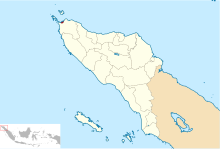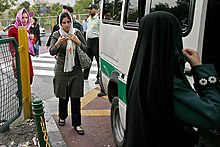Religious police
This article needs additional citations for verification. (July 2021) |
Religious police are any police force responsible for the enforcement of religious norms and associated religious laws. Most religious police in modern society are Islamic and can be found in countries with large Muslim population, such as Saudi Arabia or Iran. The responsibilities of religious police heavily vary by religion and culture. For example, the Islamic religious police prioritize the prevention of alcohol consumption, playing of music and public display of affection, Western holidays, and prayer time absences. On the other hand, the religious police force in Vietnam are responsible for monitoring religious extremists, such as Dega Protestants or Ha Mon Catholics.[1]
Evolution of religious police[]
Religious police can be divided into two categories, those who are upholding the values of a certain religion and those who are responsible for extremist religious groups. Every major religion has a set of rules expected to be followed by their believers as a lifestyle and passages to support its enforcement.
In Islam, the doctrine of Hisbah dictates a duty for the Muslims to promote moral virtue and intervene when another believer is not acting accordingly. The passage holds a core value from the Quran of enjoining good and forbidding wrong.[2] Throughout history, there is evidence that Islamic religious policing has existed for centuries. In the earliest form of religious policing, Muhtasib or “market inspector” is a public official entrusted with preventing fraud, public morality infractions, and disturbance of public order. However, this position disappeared worldwide as society modernize before reappearing in the first Saudi state, Diriyah, from 1745 to 1818. In the early 20th century, Ibn Sa’ud appointed his followers as muhtasibs and very strictly enforced the rules, which caused a conflict between foreign pilgrim and the local population.
The other side of religious policing are forces who are overseeing, if considered to be, religious extremist groups. With the recent spike in interest for religious groups, more people are joining extreme religious groups worldwide.[3] Governments often create a task force in local areas where most group members are based in. However, if an extreme religious group poses a threat to public safety, the responsibility often lies on a more formal intelligence agency instead of a local task force. However, in certain cases, the fear for public safety is simply a ruse to be used as an excuse by governments to limit religious freedom, such as the case of Dega Christians in Vietnam. Ethnic minorities who are Evangelical Christians were chased out of their homes and into the forest as harassment and discrimination against them ran rampant. In Vietnam, a religion must be approved by the VCP (Communist Party of Vietnam) and have their leaders vetted by government authorities for worship services to be legal. However, unregistered Protestant “house churches” in minority areas are deemed “illegal” or a Dega Christian. The Vietnamese Communist Party created a task force to watch the Dega Christians and in some cases, harass and assault them.
Despite its controversial nature, religious police forces are still common in Islamic societies. These institutions have the powerful support of the conservative part of the population and government officials but are often met with opposition from its younger population and liberals. However, religious police forces often conflicts with local police. For example, the Nigerian State of Kano witnessed a rocky relationship between their religious police force and civil police force. Some religious forces only survived because of protection from the country's constitution, namely Iran. Despite Hassan Rouhani's stern criticism of Iran's religious police, he did not have power to change anything as the acting president.
Formal legalized enforcement by country[]
Indonesia

After the 2004 tsunami in Aceh, the people believe that it was a form of punishment from God, which caused the governor, Mustafa Abubakar,[4] to officially launch the Polisi Syariat Islam.[5] The task force started our with 13 officers in 2005 and grew to 62 officers, including 14 females by 2009. However, the organization has a total of more than 1,000 people where at least 400 people are under contract and the rest are volunteers. Polisi Syariat Islam is devoted to catching anyone who does not strictly follow every aspect of the Sharia law. They are known to use excessive tactics, such as stalking and searching properties without proper warrants or motive. Punishments range from a 24-hour hold for physical contact between unmarried people of the opposite sex to public beatings for marriage infidelity.
Iran

Established in 2005, Guidance Patrol (Persian: گشت ارشاد,' Gašt-e Eršād)[6] is the main Islamic religious police in Iran, succeeding its similar defunct predecessor. Its mission is to impose Islamic norms of conduct and dress code in public. Similar to the religious police force in Indonesia, they also prioritize the prevention of unrelated men and women mingling without a neutral male guardian (mahram) to watch the women. They have been met with some resistance by women, especially those from more urban and affluent circles, who try to test the boundaries of the dress codes that have been set in place.
Religious police forces[]
- Committee for the Promotion of Virtue and the Prevention of Vice (Saudi Arabia)
- Committee for the Propagation of Virtue and the Prevention of Vice (Gaza Strip)
- Islamic religious police
- Kano State Hisbah Corps (Nigeria)
- Ministry for the Propagation of Virtue and the Prevention of Vice (Afghanistan)
- Patrol for the Promotion of Virtue and Prevention of Vice (Iran)
- Shomrim (neighborhood watch group)
See also[]
- Vice squad
- Presumption of guilt
- Medieval Inquisition
References[]
- ^ Angelina Theodorou (2014-03-19). "Religious police found in one-in-ten countries worldwide". Pew Research Center. Retrieved 2014-03-24.
- ^ , Wikipedia, 2021-10-24, retrieved 2021-10-24
- ^ Wibisono, Susilo; Louis, Winnifred R.; Jetten, Jolanda (2019). "A Multidimensional Analysis of Religious Extremism". Frontiers in Psychology. 10: 2560. doi:10.3389/fpsyg.2019.02560. ISSN 1664-1078. PMC 6876432. PMID 31803105.
- ^ "Gubernur Aceh dari Masa ke Masa". ACEHKITA.COM. 2020-11-05. Retrieved 2021-10-24.
- ^ , Wikipedia, 2020-08-20, retrieved 2021-10-24
- ^ "Who are Islamic 'morality police'?". BBC News. 2016-04-22. Retrieved 2021-10-24.
| Wikiquote has quotations related to: Religious police |
- Law enforcement
- Law enforcement units
- Religious law
- Religion stubs
- Law enforcement stubs